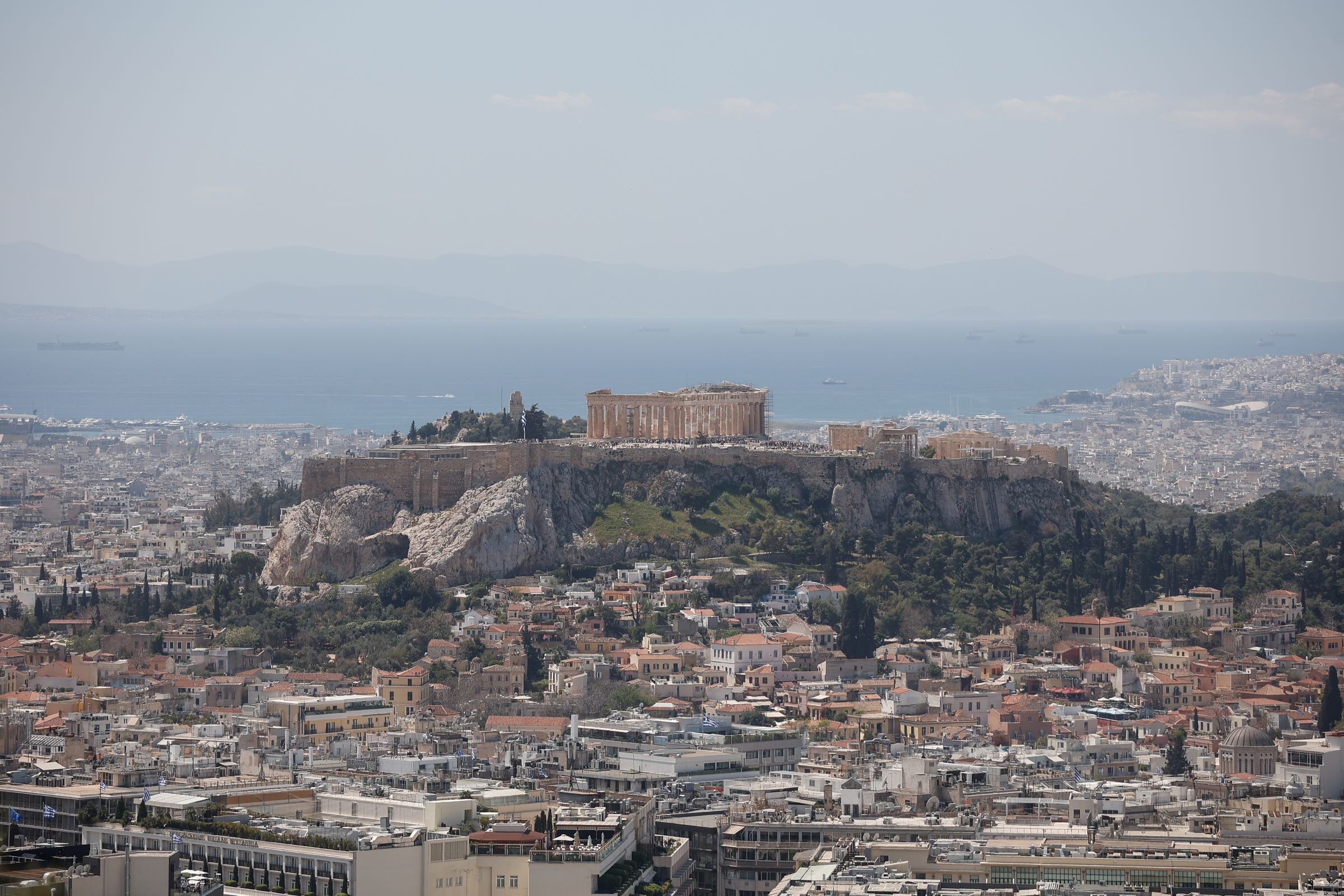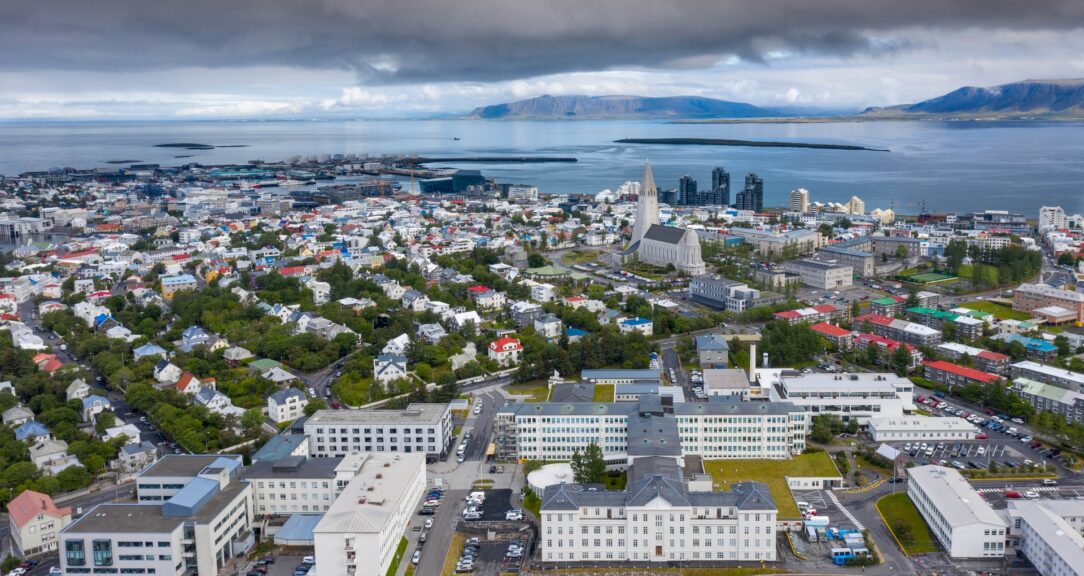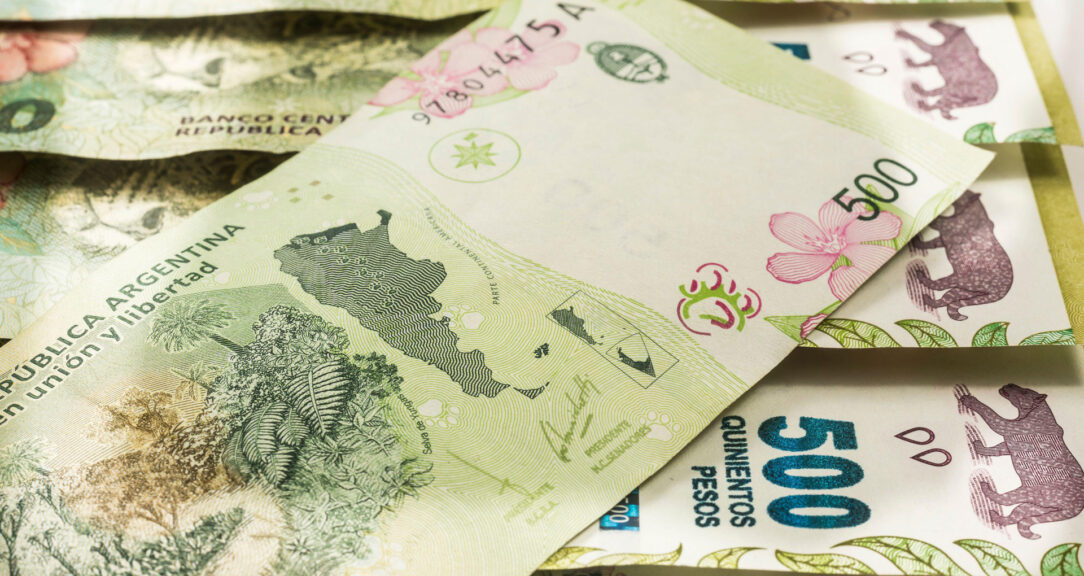Located between Africa and Asia at the edge of the eastern Mediterranean Sea, Greece sits at the crossroads of Europe.
Founded before 3,000 BCE, the history of Athens comes alive in neighborhoods such as Plaka and Thiseio, where you’ll pass by the Acropolis or the Parthenon. But although Athens is a city with thousands of years of history, life here today is vibrant and multicultural, with pleasant year-round weather and street life that stays active well past midnight.
Greece joined the European Union in 1981 and in 2001 adopted the euro as its official currency, replacing the drachma. In the last few years, Greece has been in the spotlight following its extensive financial crisis, which lasted from 2008 to 2018. In 2018, then-Prime Minister Alexis Tsipras announced the country would exit the Memorandum of Understanding made with the International Monetary Fund, the European Commission and the European Central Bank. The memoranda had laid out controversial bailout schemes that imposed austerity measures on Greece between 2010 and 2018.
The unemployment rate in Greece soared after 2008, reaching 27.8% in 2013 while the European Union average was 11.6%. Since then, the country has been on upward trajectory, but it still has the second highest unemployment rate in the European Union after Spain.
The minimum wage in Greece stands at €910 ($978) per month over a 12-month period, including holiday pay and Christmas and Easter bonuses, landing in the middle of the ranking of European countries by minimum wage. In 2022, the average full-time adjusted annual salary per employee in Greece was €16,661 ($17,900) , among the lowest in the European Union, according to Eurostat.
At the same time, the cost of living in Greece has risen significantly, including rent, food prices and petrol prices. In May 2017, the price of gas averaged just over €1.50 per liter, while today it is around €1.95 per liter. Greece is among the top 10 countries ranked by most expensive petrol prices.
And young people in particular are experiencing high unemployment rates — 21% for people under 25, and 18.2% for people ages 25 to 29, compared to 10.2% for the whole population. This means they often have a hard time affording an independent lifestyle and, in many cases, continue living with their parents. While Greece may have overcome the financial crisis, the country is still working to improve the average standard of living, with continuing challenges from the housing and inflation crises. However there is hope, as Greece had a stable economic performance in 2023 with GDP growth of 2%. This number is expected to increase slightly in 2024 (2.2%) and 2025 (2.3%).
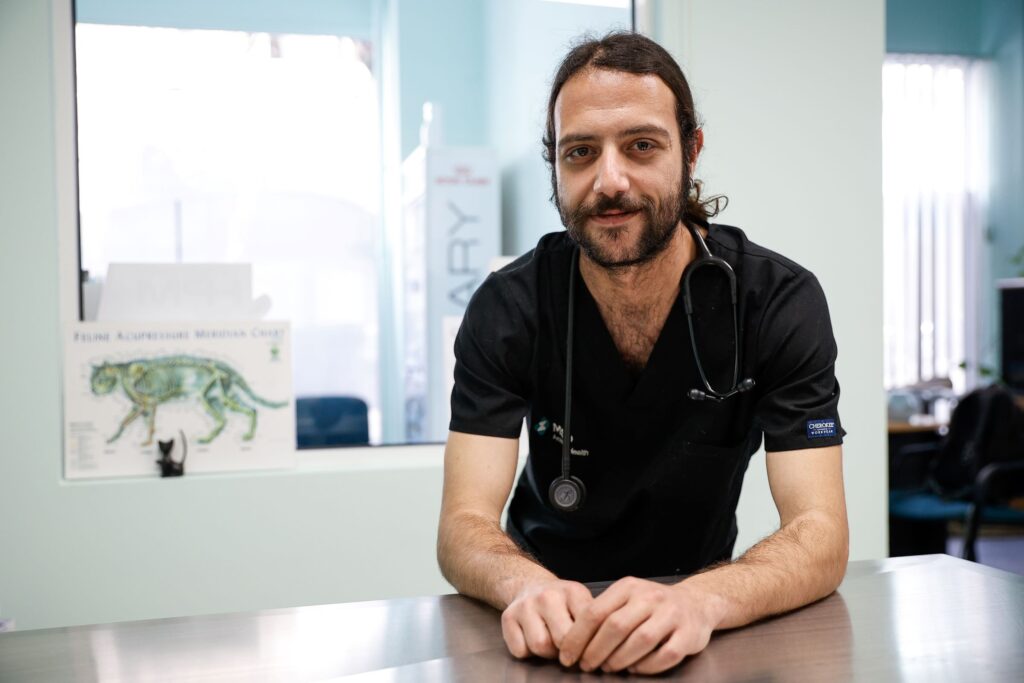
Loukas Passas, 25
Veterinarian
I have been working as a veterinarian since I was 22 years old, having studied veterinary medicine in Greece. Right now, I work in a veterinary office in Athens and I make about €1,200 ($1,277) a month. I used to work in an animal clinic, and my first salary was around €800 to €1,000.
From 18 until I turned 21, I worked in construction. The moment I received my first paycheck, what stood out to me was the feeling of independence I had. I didn’t want to necessarily buy anything in particular; I had this sense that I didn’t need anyone anymore.
As far as veterinary medicine is concerned, it has a very wide scope and I feel secure both professionally and scientifically. In this industry, one can either open their own veterinary practice and be a first opinion veterinarian, or they can specialize in any field of veterinary medicine. Most people choose clinical veterinary medicine, and I followed the same path. As animal rights become more significant in society, science evolves accordingly.
Veterinary medicine was one of the professions least affected by the financial crisis. If you ask me, what has changed in recent years is that people in this industry used to work without being paid. In our generation this has changed. You can’t start working for nothing. I think one can rely financially on this profession given its possibilities and future.
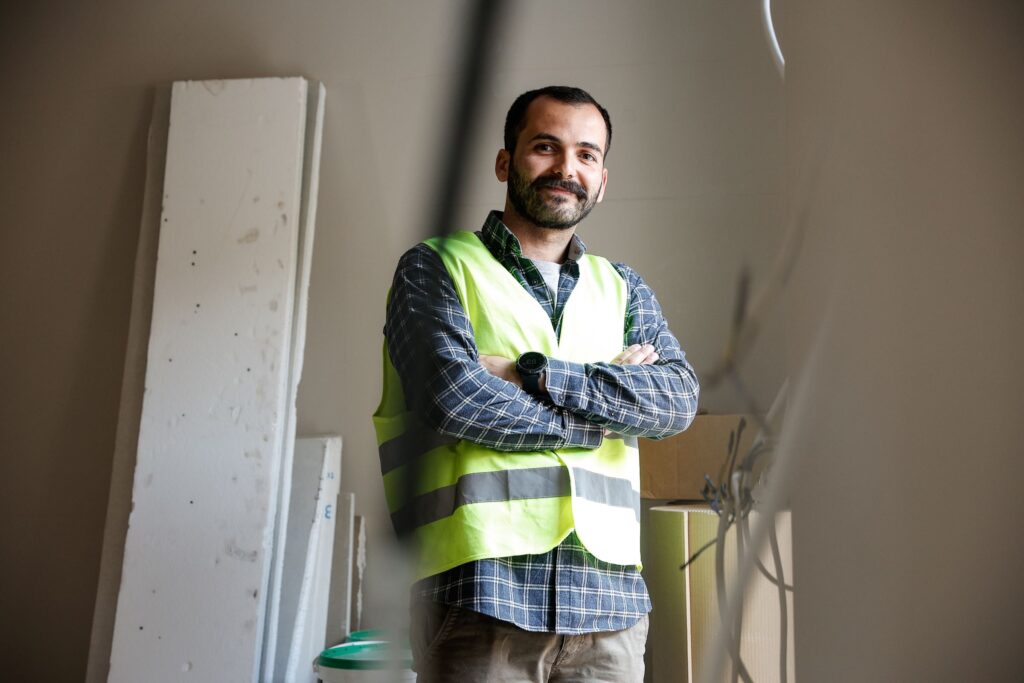
Kostas Karamitros, 29
Electrical engineer
Since April 2020, after I finished my studies at the National Technical University of Athens, I have been working as an electrical engineer.
As a student, I worked as a waiter part time on weekends and earned €40 to €50 a day, about €450 to €500 a month, depending on the tips. I was spending my salary almost exclusively on hobbies, and when I received the first paycheck in my account, I bought snowboard equipment.
The company I work for now is involved with project management, and I really enjoy my job. I handle the entire management of all the synergies needed to complete a housing project. On average I make €20,000 to €22,000 a year, depending on the work that comes up.
The money I make is not really sufficient for the cost of living in Athens. I live by myself and I pay €600 for rent each month, and the electricity and water bills can total €800 for the winter. I own a dog, and my daily expenses are around €15 to €20. My salary is considered higher than average in Greece, and yet even that is not enough. However, it is a well-paid profession compared to other industries in Greece.
I think electrical engineering is the profession of the future. Electrical engineering school has a huge range of career paths; you can go into robotics or even become a CEO. This profession offers a lot of potential both in Greece and abroad. Considering what is currently happening with artificial intelligence, electrical engineering is a breakthrough career path.
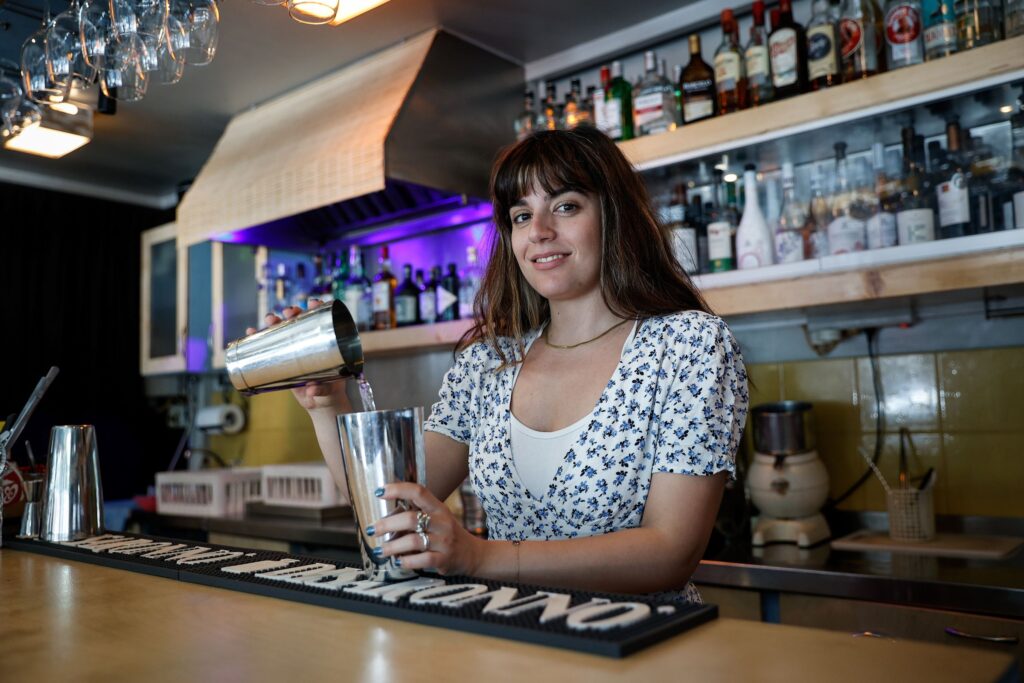
Angie Sarigeorgiou, 29
Waitress
I’ve done 13 or 14 different jobs since I was 18, and right now I am a waitress in a bar in Athens making around €400 a month, working two days a week. At the same time, I am a Pilates teacher and I do personal training for a couple of people. In total I earn around €900 a month.
The average wage in the catering sector is higher in the majority of European countries than in Greece. Last year when I lived in Portugal on my own, earning €600 a month was enough even though I was paying €300 in rent along with all the expenses I had. I wasn’t comfortable, but in the end I got by.
My parents have supported me a lot, but they couldn’t entirely support me over the years, so I’ve been doing side jobs to support my dance studies.
My first job in a jewelry shop paid €3 an hour. Back then I had no expenses, therefore I was just hanging out, shopping and drinking with my salary.
Right now I live with my mom, so I don’t have rent to pay, but I have expenses, such as the car I just bought. My income would not be enough if I lived on my own. If I had to pay rent while earning €900 a month, I wouldn’t be able to make ends meet.
I’d like to be able to live independently as a dancer though. But I cannot do that in Greece. It is not easy abroad either, yet it is somehow more possible compared to Athens.
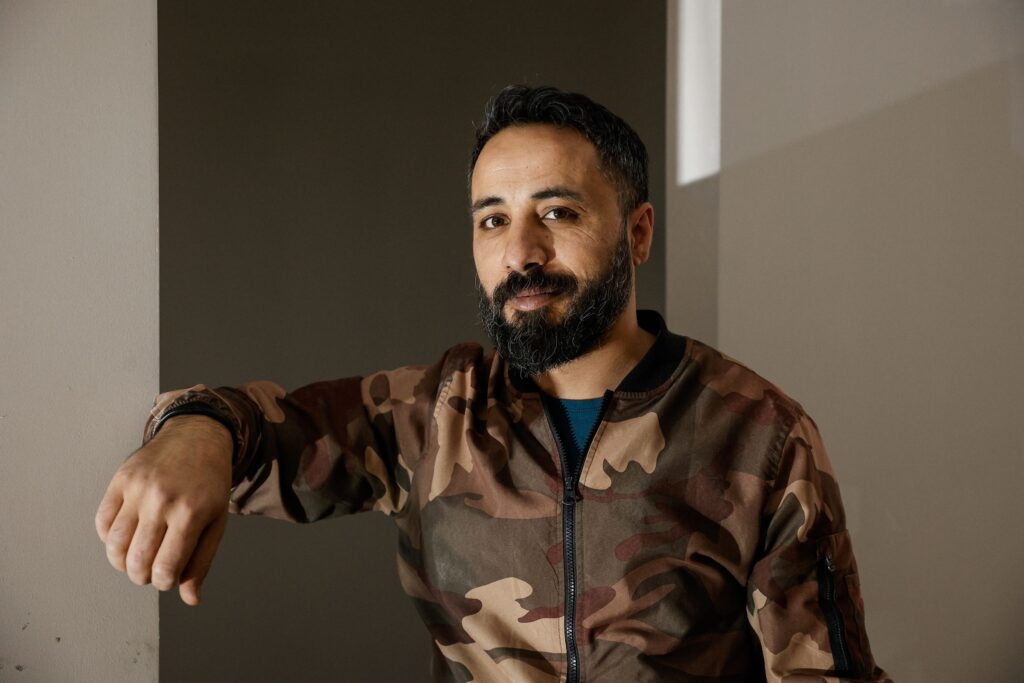
Nouri, 36
Laborer
I am a Kurd from Syria, and I have been in Greece since 2012. When I came here, I was detained at the border as I was entering Greece and held for five and a half years. When I got out in 2017, I cleaned houses for a living for four months. My first wage was €30 a day. In Syria I did many jobs, working as a cleaner and a painter’s assistant. Now, I’m a laborer; I work in carpentry and I make about €1,000 a month.
I got into this line of work when a painter friend of mine invited me to join a job to do some tiling. And then a handyman called my friend and asked him to find a helper. I didn’t want to go at first. But he insisted, so I went once to try it. Well, then I got hooked, and I’m still working to this day.
So far, I haven’t bought anything with the money I make. I only spend my salary for my house expenses and to cover my basic needs.
For me, this job is very good. I am happy and I want to learn more, because there is a lot of work in this field in Greece. Also, I can’t do heavy work, such as demolishing a wall — I would get too tired — whereas what I’m doing now is not so tiring.
I have done a lot of jobs. Cleaning, assistant in painting, garden maintenance, etc. When I started working back then, it was more difficult to get a job. Now it is easier, I think.
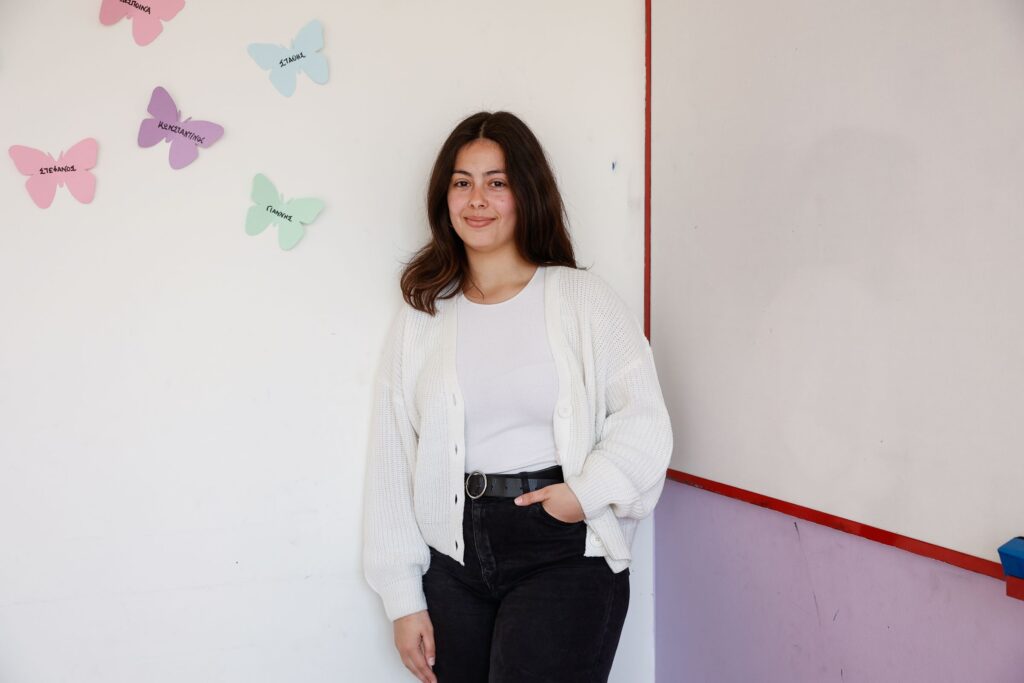
Katerina Plastira, 26
Philologist
I started working as a philologist in 2022, having studied philology and the teaching of ancient and modern Greek in Thessaloniki.
I currently work in three tutorial centers, earning about €850 per month, depending on the number of hours I get. I teach lessons for children from second grade up to the first year of high school. At the same time, I am currently finishing my master’s degree on new technologies in education, at the pedagogical department of the National and Kapodistrian University of Athens.
My parents help me pay my rent, but in all other parts of my daily life I manage to get by on my salary. Being able to pay for the rent on my own is a goal over the next few years. Aside from the daily expenses we all have, whether it’s basic necessities or optional expenses, I’m trying to save.
I like my job. I also like the subject a lot, both the studying and teaching parts. When I started out, I was thinking of getting into a public school. Now I don’t know if I want to do that; I don’t even know if it’s possible. Do I want to spend years and money doing another master’s degree — in order to be appointed in a public school in Greece you must hold two master’s degrees — and then be a deputy teacher for €800 per month and still have to pay for a place to live? I don’t know if I ultimately want that. On the other hand, I don’t imagine myself forever in the private sector and in the tutoring business. So, it’s not very clear to me what I would like to do.
I don’t have any scale of reference to other European countries, but in general I think that even in the public sector, teachers are low paid. Teachers who have been teaching for years have a ceiling of €1,300 a month.

Iro Biskini, 27
Senior logistics coordinator
I have been working as a senior logistics coordinator in a marine logistics company since I finished my studies in 2019 at the University of Piraeus. I started my internship there and as soon as I completed it, I started working full time. Today I earn €1,700 per month. Prior to working for this company, I worked in a cinema in customer service, and my first salary was €400 a month.
At this stage of my life, I cannot afford living on my own because I have fixed expenses which do not let me easily save, such as my car that I pay for in installments and some other loans that I needed to obtain.
I try to save money; however, it is not very easy either as you get older and your debts rise, or considering the inflation rate in Greece. I believe that one can live on their own in Athens on €1,700 a month, but having fixed expenses like me, it’s not easy. In my case, in order not to sacrifice my comfortable social life and some investments for the future, I prefer to stay at my parents’ house rather than be pressured.
There are so many opportunities in the shipping industry, and I only realized this when I started working. I didn’t even know about my sector when I was a student. Shipping is so wide-ranging — you are involved with so many things. I think I can move up even further in terms of salary and eventually get a position with more responsibility. The potential is there. The shipping industry is a rich industry and always will be.
Read more
Sign up to keep up to date with ReThink Q.
